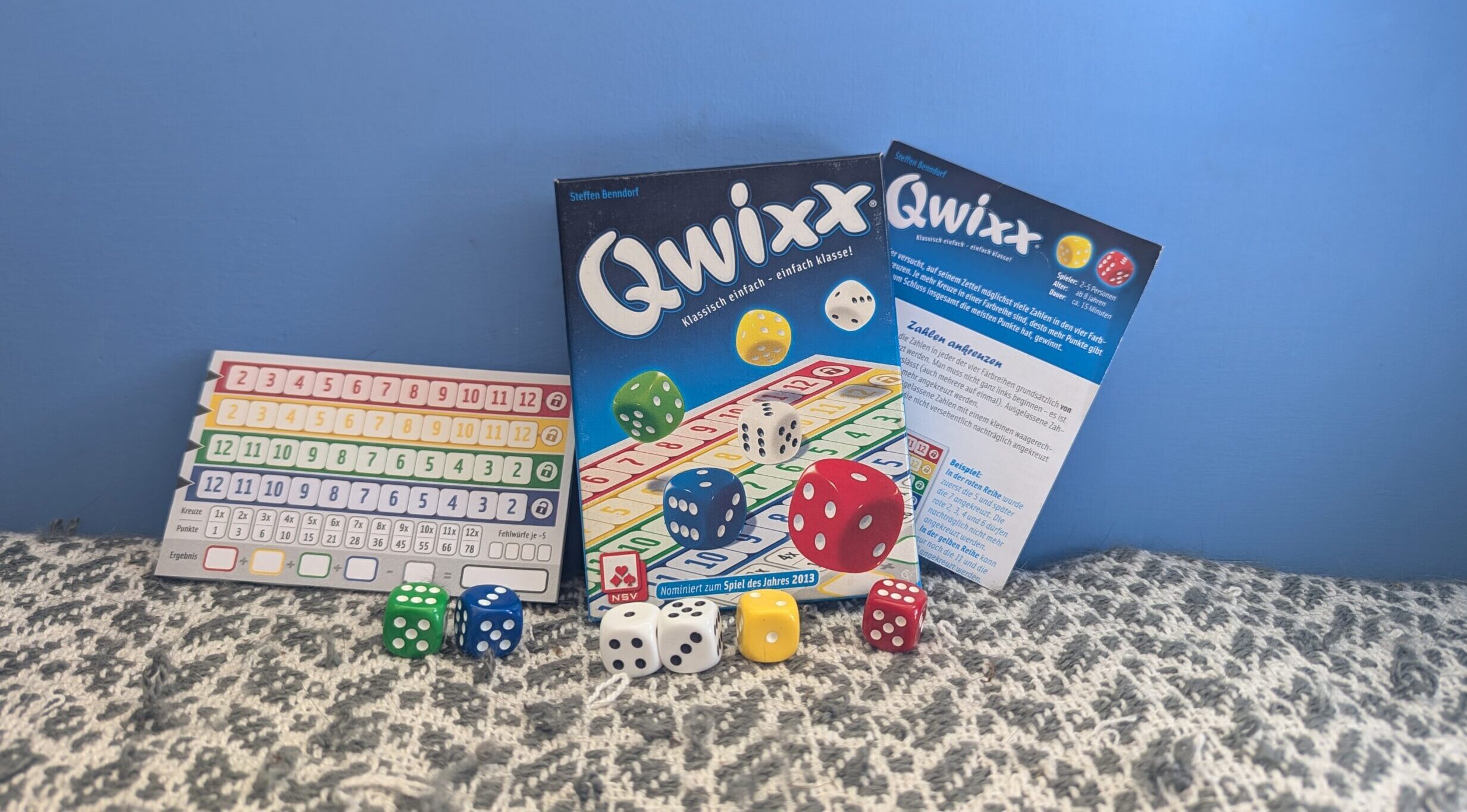The Boardgame Project: Qwixx

- BoardgamesPortfolio
Intro
Qwixx is a fun little game that doesn’t take much time and only really requires coloured dice—as there is a scorecard app as well as printable versions you can find here and elsewhere online. There are English editions of the game, including on Amazon, but the German-published set is more readily available. Likewise, the English rules I’ve uploaded here are just another version among several. Whether you use mine or someone else’s, I hope you get to playing the game and having fun with it!
As usual, I’ve attached a (hopefully) brief translation commentary below.
DTP Shenanigans
Deciding it would be fun, I decided to switch up some of the German graphics, which also helps to establish some distance from the official versions. I am by no means an expert at graphic design or desk-top publishing (DTP), but being able to at least work with a suite of tools can be hugely beneficial for my work so I decided to commit the hours to poorly designing vector-graphic dice…
※Should you be interested, I’ve been using Krita for this and other graphics on the website, although it’s limited for vector graphics. Recently, I’ve downloaded GIMP (raster graphics) and Inkscape (vector graphics) to try out as well. All freeware.
In the course of this first foray into boardgames and, more broadly, properly publishing PDFs, I finally had reason to learn an actual DTP tool, Scribus! (Freeware again). Getting into DTP is on my professional bucket-list and I now realise that it will let me, to a certain extent, directly import and edit PDFs (as long as I have the right fonts downloaded) which opens up a bunch of other options for me when doing these projects.
CPD, it works.
The main motivation this time around were the image files I was using. Finding myself incapable of creating 3D dice like in the DEU original, I decided to take photos of some of my own dice and use them instead. However, I had issues with PNG and JPEG file types going blurry when exported from Word, regardless of the settings I used or how I edited the images in other tools. Asking some more-skilled friends for advice and then using the proper software helped immensely in fixing this and I’m strangely overjoyed that I encountered this issue—as stressful as it was at first—because of the options I now have for future projects!
The Short and Sweet Bits
There’s nothing like a little slogan.
Except where they rely on play on words, which is often. And most of the time, such puns don’t quite work in the target language and need to be reimagined.
In this case, I rather liked the original “klassisch einfach – einfach klasse”. A back translation that retains some of the German playfulness might look like this: “classically simple, simply class” where “class” is British English slang for “really good”. It’s a little bit forced, though, so I decided to change the wordplay to an easy one: the rule of three.
Classic Simple Fun
If we were to play with punctuation, this would also have its own duality to compare to the German’s. “Classic, simple, fun” where they’re all adjectives to describe the game and “classic, simple fun”, where classic and simple are adverbs affecting “fun”. Perhaps this counts as me overthinking things (known to happen) but by avoiding punctuation and using spaces to separate the words, I’ve allowed for some ambiguity in how this little slogan is read.
※At least I think I’m clever.
Distance
One of the most interesting concepts I’ve come across when it comes to translation and copywriting is that of “distance”, namely between speaker and receiver, which can often be enforced through grammar and/or register and takes into account the different, presumed social standings of the parties involved.
For example, an authority writing to the public is going to use different language to communicate their message than a recipe blogger to their followers. Not only that, but the norms surrounding “distance” and what is expected for any given context changes depending on the culture you’re in as different cultures will prefer more or less distance in the same situations.
※If you want to read more on this, I recommend looking up Ira Torresi and her work on Translating Promotional and Advertising Texts.
A lot of the time, I find German to cling to a certain level of grammatical distance: polite-form you (Sie), long sentences which raise the register, fairly unemotional text which conforms to written-language norms. In a world with the internet and increased access to self-publishing, though, I also notice this to be shifting quite considerably. A lot of blogs (similar to my own style) tend to write in a way that is a lot more like spoken German, with simpler and shorter sentence structures and more familiar language.
Of course, the medium plays a large part in what level of distance is opted for. In the case of these instructions (and all those I’ve currently read and drafted), there has been clear avoidance of saying “you”, either in polite or familiar (du) form. Instead, “the player” with accompanying “they”/”their” pronouns have been opted for. Other than that, the language tends to be easy to follow (for younger audiences) and relatively neutral in register.
The issue then is whether I should reflect that in the English. Generally speaking, English (especially modern English) tends to prefer a lack of distance. “You” is a lot more frequent, being direct and informal tends to be more the norm. You don’t often see third-person “one” so much anymore outside of academic or non-fiction texts (in my own experience, at least) and similar to Germany, we’re also writing a lot more in accordance with spoken norms. This is also why you’ll find me writing with contractions a lot—including in this translation—despite the fact that I can hear my secondary-school English teacher screaming in my head every time I do.
That being said, a lot of boardgames I have in English tend to like this third-person “player” with a neutral register as well (not that this is something I noticed before going and looking for it) and so I decided to keep it. Although it doesn’t feel unnatural to read because of this, I still had to consciously avoid drifting into using “you” and “your” and reducing the distance. Maybe that’s just me.
Accessibility
You might have noticed that I’ve including an English version of Qwixx’s scorecards. That might seem strange considering that there’s only four German words on the originals and the English versions I could find online for comparison (my original plan was just to link them) tend to rely on non-verbal signs.
Partly, I decided to include this so that I could properly translate the word “Fehlwurf” as “misthrow” as this is something me and my English-speaking friends use when playing the game. (They also like to just butcher the German word, which is funny for about 5 minutes until they start sounding like an off-key Scooby-Doo, then it’s just disturbing).
Rehlrurf, Raggy.
I also realised that this was a good opportunity to make some design changes so that it’d be easier to print the scorecards in black and white or be more accessible to colour-blind players by including letters at the start of each colour-column. In a way, you can blame the game Among Us for that, where you play as an astronaut trying to complete minigames while an “impostor” tries to sneakily unalive you.
This sounds like a strange segue but it is relevant: just as the game was going through its popularity boom (some fair few years ago now), an update was released which added symbols—such as stars, squares, circles, etc—to colour-matching tasks so that colour-blind players wouldn’t be at a disadvantage. That choice has always stuck with me and is something I always think of when any game or media has matching colours as part of the experience.
※Like the 2001 movie Cats and Dogs where a spy-dog has to cut the red wire to diffuse a bomb (but, being a dog, is colour blind and just sees a mass of grey).
This is also why grounding wire is often stiped yellow and green so it’s easily distinguishable. Accessibility in design can be very simple to factor in, but also easily overlooked.
Conclusion
In the end, I’m super happy that I started with Qwixx. It gave me the opportunity to start working on DTP skills and further my graphic design repertoire. It’s also just a really fun game.
As I seem to be saying a lot lately, I hope the commentary here has again shown that translation is never just about swapping one word for another and a translator is more than a glorified dictionary.
(Also I have a terrible memory and would be an awful human dictionary… )
I look forward to further adding to The Boardgame Project.
The Boardgame Project
This is a smaller set of portfolio blogs based around boardgames. I recently had the opportunity to apply to an agency that specialised in this kind of translation but ran against the usual wall of “we want experience”.
“But how do I get experience in this fairly niche part of the industry!?” I asked myself, before remembering the pile of German-language boardgames sitting at the bottom of my cupboard…
Picking out the ones that didn’t have English translations in them, I decided to translate them “blind”, ie. without reading the official English translations online should they have them, before then adding these to my portfolio.
The following are the current list of boardgames I’ve translated which I will update as I go! You can find the PDF(s) in the introduction of each entry.
Image credit: me
- All Posts
- Blog
- Portfolio
- Back
- Public Authorities
- Tourism
- Antiques
- General Medical
- Quality Control
- Translation
- Coursework
- Paid
- Voluntary
- Business
- Games Industry
- Machine Translation
- Post Editing
- Theory
- Baking
- Recipes
- Literary
- General Legal
- Subtitling
- Audiovisual
- Transcribing
- Entertainment
- Professional Development
- Official Documents
- Driving Licences
- Boardgames
- Back
- Rate mal!



